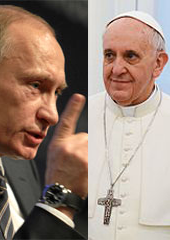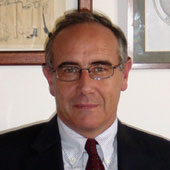After American Dominance: The New Pope’s Foreign Policy
What it means for the Middle East.
March 2, 2014

The stalemate in Syria has veiled a major change that occurred in last six months with regard to realigning global players engaged in the Middle East.
First and foremost, it has hidden the de facto alliance between Russia’s Vladimir Putin and Pope Francis on Syria. More broadly, both share a similar analysis on the results of the Arab Spring.
The Vatican is coming back into the international diplomatic arena, but with a different profile. There is now a post-Cold War Argentinian pontiff in Rome. Unlike many of his predecessors, Francis is not perceived as a kind of religious corollary of the North Atlantic Alliance.
Pope Francis is the first global pope. This is a big departure from John Paul II (r. 1978-2005). His life had been shaped by the struggle against communism – and hence was a natural ally to the United States until the Soviet empire collapsed.
Benedict XVI (r. 2005-2013) focused on a Eurocentric approach. He was mainly concerned about Europe’s increasing secularization, even though Catholicism, as a dynamic force, was growing in other parts of the world.
Syria demonstrates a convergence of interests between the Vatican’s Catholic ecumenism and Russia’s Orthodox nationalism. Francis views Putin as a sort of Christian Czar, defender of Christian minorities in a Middle East that, not by chance, the Vatican labels “the Near East.”
Beyond a unipolar world
Why does this new Russo-Papal Alliance matter? First of all, the Vatican is simply not at ease in a unipolar world.
A world dominated by just the United States as a global policeman, as was the case after 1990, is worrying the Holy See. It views this as detrimental to its strategy and role. To exercise its soft power, the Vatican needs many players on the world stage.
In the last ten years or so, the Holy See also expressed strong criticism for the unilateral war in Iraq.
The Syrian crisis offered Francis the opportunity to show that, beyond the United States, there are a number of key state and non-state actors.
And it was a useful reminder of Russia’s relevance on the global stage. In preventing a military attack against Bashar Assad’s regime, Putin was at least as important as U.S. President Barack Obama.
What happened in the autumn of 2013 is very telling. Pope Francis intervened to join the front determined to stop the spiral towards a war in Syria. He expressed the concerns of most of Western public opinion. And he spoke out against a military strike, saying what Obama probably feared himself, but couldn’t admit publicly.
A man thinking in geographic shapes
The leader of the Catholic Church succeeded, filling a leadership void.
This move also corrected the previous perception was of a strategic alignment between the Vatican and an aggressive West, which, from the Vatican’s viewpoint, had been a reluctant and forced one. The pontiff was anxious to distance the Holy See from U.S. unipolarism.
Multipolarism is particularly coherent to Francis’s mindset. The pontiff uses geometrical figures to depict global society. He conceptualizes the world in the age of globalization not as a polished sphere, without angles and differences. Rather, he sees it as a polyhedron with many different faces. In short, he believes the world is invigorated in its unity by its diversity.
Recognizing these divergent trends in foreign policy means promoting and accepting pluralism and a reinvigorated balance of powers. The Pope developed this vision during his years as archbishop of Buenos Aires, a global, Latin American megacity where interfaith relations and inequalities are the rule.
An honest broker in Rome
In some way, this new approach toward the Middle East has been necessitated by the mistakes of the West in the region. The United States weakened its credibility and strength in the Middle East with the war in Iraq and other short-sighted actions.
The uncritical support of the Arab Spring in North Africa and then the shifting strategy towards the regime in Egypt further hollowed out America’s standing in the region.
This criticism is nothing to be laid at the feet of Obama only. Most of the present difficulties are a byproduct of George W. Bush’s presidency.
Meanwhile, Europe tends to show indifference for the destiny of native Christians living in the difficult environment of the Middle East.
As a result, for the Vatican, the decisions taken in the last ten years or so by Western powers have been a disaster for the region’s Christians.
Changing paradigms
The Catholic Church in the Arab world found itself squeezed between two accusations. It is either portrayed as the accomplice of old tyrants and dictators, who led secular regimes that granted the survival to Christian minorities. Or it is cast as a Trojan horse bearing rotten Western values and Western military invaders, within increasingly Islamized societies.
The controversial outcome of the recent revolutions confirmed the Holy See’s cautious stance toward the Arab Spring. They underscored the risk of a “religious cleansing” that the collapse of old regimes and the growing Islamization of those governments imply.
The crisis in Syria is the ultimate revelation of how the old paradigms in the Middle East are suddenly aging. And it reveals how the Vatican is one of the international actors ready to understand this major change and seize it to reassert its presence.
Editor’s note: This article is based on the speech delivered by the author in February 2014 at the Royal Institute of International Affairs, Chatham House, in London, chaired by Nomi Bar Yaacov, on “The New Vatican Foreign Policy.”
Takeaways
Francis is anxious to distance the Holy See from U.S. unipolarism. Multipolarism shapes Francis’s mindset.
Under Francis, the Vatican is re-emerging in the international diplomatic arena, with a different profile.
Pope Francis is not perceived by Moscow, unlike many of his predecessors, as a kind of religious corollary to NATO.
Syria shows converging interests between the Vatican’s Catholic ecumenism and Russia’s Orthodox nationalism.
Francis views Putin as a sort of Christian Czar, defender of Christian minorities in a Middle East.
On Syria, Francis said what Obama probably feared himself, but couldn’t admit publicly.
Read previous

The Russo-Papal Alliance in the Mideast
March 2, 2014
